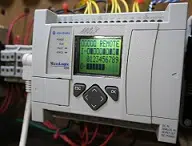The acronym PLC has several uses. The most common is linked to the English expression programmable logic controller , which can be translated as programmable logic controller .
 This is the name given to the device that allows the automation of an electromechanical process . It is a computer that is responsible for controlling the operation of the machines used in production or assembly.
This is the name given to the device that allows the automation of an electromechanical process . It is a computer that is responsible for controlling the operation of the machines used in production or assembly.
A PLC can work with wide temperature ranges, is resistant to impacts and vibrations and can manage a large number of output and input signals simultaneously. The first models emerged in the late '60s .
Today a PLC has capabilities similar to those of desktop computers. They can control various processes and movements and network communications, for example.
The CPU , an acronym in English that refers to the central processing unit , is the essential component of the PLC . It is made up of the processor that executes the program and the memory that contains said program. The PLC also has input interfaces (which receive signals from keys, buttons, etc.) and output interfaces (to control valves, motors and other actuators).
Currently, there are various types of PLCs and among the most significant are slot, modular, narrowband or compact.
The PLC , in short, is a special computer that is used at an industrial level for processing machine data. Thanks to these elements, all types of industrial processes can be automatically controlled.
Other information of interest about the PLC are the following:
-They were created at the end of the 1960s to, above all, be able to technologically replace control systems that were based on switches and even circuits with relays.
-It is established that the father of the PLC is none other than Dick Morley, who participated in the project that shaped the first programmable logic controller. We are referring to the project launched by the General Motors division that went by the name of GM Hydramatic.
-In addition to those mentioned above, other advantages of using the PLC are that a significant amount of time can be saved or even that the cost of its maintenance is very economical. To this we must add that it saves on labor, that it has small and compact dimensions and that it is very resistant.
-Among its main disadvantages we can establish that there is the fact that in the company or factory that is used there will have to be a professional specialized in its use and also in its maintenance.
In addition to everything indicated, we cannot ignore that PLC is the name of a training and support portal not only for students in the electricity sector but also for its professionals.
PLC , finally, can mention power line communications ; to phospholipase C ; to the Liberal Party of Cuba ; to the Liberal Party of Canada ; or the Constitutionalist Liberal Party .
